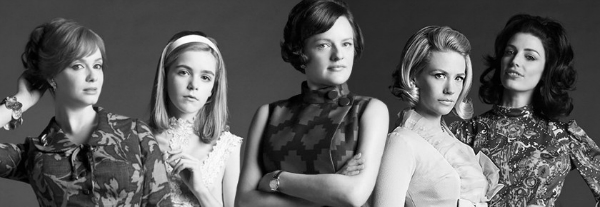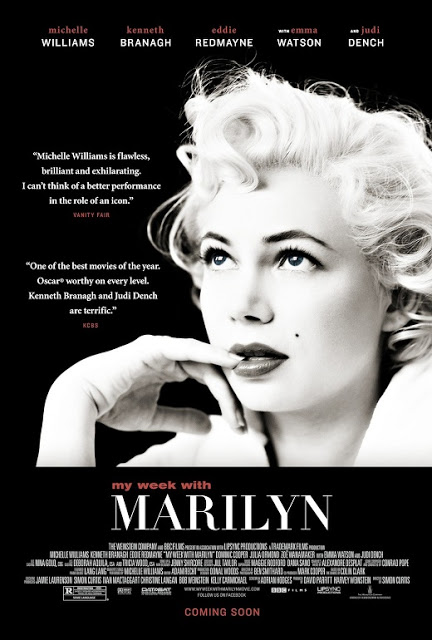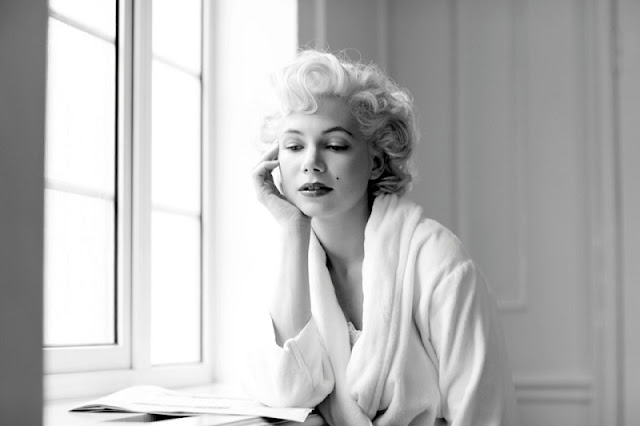
This guest post by Danielle Winston appears as part of our theme week on Representations of Female Sexual Desire.
The glossy backdrop for AMC’s Mad Men is the high-stakes Manhattan advertising game, namely the office of Sterling Cooper. Set right smack dab in the feminist revolution, when season 1 takes off, it’s 1960: the year birth control pills received approval by the FDA.
Mad Men’s stylized universe revolves around the Jagger of the ad world: the ever-enigmatic Don Draper (Jon Hamm).
Fascinating women surround Don at Sterling Cooper. And sometimes just looking at Mr. Tall Dark and Dreamy can steam up their Ray Bans, but more often, he’s so exasperating they struggle with the urge to whack some sense into him with their clutch purses.

In between writing copy for Lucky Strike, pitching the Cool Whip clients, and lunching at the automat, the men of Sterling Cooper swig scotch and flirt so unabashedly with the secretaries, their actions often cross over into sexual harassment territory, which is totally cool, since it hadn’t been invented yet. Meanwhile, the lucky ladies at the receiving end usually proffer demure smiles, and make sure to reveal just enough ankle real estate to warrant their attentions. As these women partake in the flirtation-dance, their longings are kept under wraps, not unlike the tattered copy of Lady Chatterly’s Lover, which magically opens to the “good parts by itself,” and is tossed around amongst the giddy secretarial pool behind closed doors.
Peggy Olson (Elizabeth Moss) arrives at Sterling Cooper fresh out of Miss Deaver’s Secretarial School with a bouncy ponytail and can-do attitude. Given the demanding position of Donald Draper’s latest secretary, Peggy is uneasy when she finds herself flooded with salacious stares from countless male coworkers. Soon Peggy becomes so distressed by an unwanted sexual advance from a copywriter, she can’t do her work. When she confides in her supervisor, Joan, instead of being met with empathy, Joan tells her that a plain-Jane like Peggy should enjoy her “new girl” status, considering the extra attention surely won’t last. What Joan doesn’t realize is, however naïve Peggy may appear, she is far more clever than her facade suggests, and will zoom up the corporate ladder like no woman ever has at Sterling Cooper.

The first hint into Peggy’s sexual attitude is her visit to a gynecologist, where she hopes to procure a prescription for birth control pills. But with sexual freedom comes the price tag of humiliation. While in the stirrups, the smarmy male doctor advises Peggy that pills are “$11 a pop,” so she shouldn’t become “the town-pump just to get her money’s worth.” And if that’s not enough to scare the sexy out of Peggy, he adds with a smirk that if she dares to “abuse the privilege,” he will revoke her prescription.
Peggy doesn’t scare easily. She’s highly complex. In perhaps in the first glimpse into her private desires, while alone in the office with Don, Peggy places a warm hand atop his, and lets it linger a beat too long. Put off by the advance, Don tells her, “I’m not your boyfriend,” and sends her a strong message to never to veer into this territory again. Don’s reaction is tricky to comprehend, especially since he’s established as a philanderer. Is this sudden bout of professionalism sincere? Is Peggy simply not his type? Or is the mere fact that Peggy made the first move such a turnoff it immediately labels her as undesirable?

Even more curious is Peggy’s experience with another maddening man: Pete Campbell (Vincent Kartheiser). When she first meets the engaged but overly flirtatious account man who is known for his poor manners with women, Pete’s overtures makes Peggy so uneasy she refuses to wait alone with him, even for a few minutes. The encounter takes an unexpected turn when later that evening, Pete shows up at Peggy’s apartment door, drunk, and confesses he couldn’t stop thinking about her. Instead of sending him away and/or slapping the sleaze out of him, Peggy takes him to bed. Was Peggy so flattered by Pete’s desire it awoke her own? Perhaps Don’s rebuff caused Peggy’s powers of sexual reasoning to be muddied. Then, when the liaison leaves her pregnant, Peggy hasn’t a clue. She believes she’s merely gotten fat. It’s not until the startling episode where she gives birth that Peggy discovers the truth. Afterward, she gives the baby to a relative to raise and resumes her life as a single woman.
Soon Don recognizes Peggy’s creative talents, promotes her, and she becomes a successful copywriter. As Peggy evolves, she rises through the ranks on merit, and along the way has a potpourri of unsatisfying boyfriends and love affairs.
Fast-forward to season 6: Peggy’s new boss, the earnest (and married) Ted (Kevin Rahm), confesses romantic feelings for her. During this time, Peggy’s desire is illustrated, as she longs for the man she can’t have. Unable to resist Ted, Peggy falls hard for him. In a love scene where she finally surrenders to her feelings, we witness Peggy’s intense burn. Sadly, instead of finding love, her hopes are dashed the next day when a guilt-ridden Ted leaves New York and decides to stay with his wife. More insight into her desire: Peggy can’t shake lingering feelings for Ted, and they carry over into season 7. So passionate is Peggy when she believes Ted has sent her long-stemmed red roses, she all but shreds them in front of her secretary, Shirley (Sola Bamis), only to discover that they were never hers in the first place, much like dear, old Ted.

Carefree about her sexual persona, Joan often dresses in red to accentuate her ample curves, and early in the show’s run, she enjoys an affair with her married boss, Roger Sterling (John Slattery), and chooses to keep a no-strings-attached vibe. This woman has lovers, flirts with ease, and when she doesn’t feel like paying for lunch, allows the men in the office the privilege of treating her.
After playing the field with finesse, Joan falls in love with a handsome medical student, Greg Harris (Gerald Downey), and it looks as though she’ll have the American dream, something we never dreamed she ever wanted. But all goes sour when Greg discovers that Joan has been intimate with a host of other men before him, and in a fit of rage, he rapes her. Instead of leaving him, as we would expect from the strong-willed, take-no-bullshit Joan, she does the unthinkable… and marries him. And then, even though she is unfulfilled in her marriage, with the exception of a quickie with her ex-lover Roger after they’re both mugged (this is less about desire and more about comfort), Joan is faithful to her husband the whole time he is away in the army.
Later in the series, in a rare scene, Joan and Don play hooky from work, and over cocktails at a bar, Joan asks him if he was ever interested in her. With a whiskey buzz, Don confesses when he met Joan that she scared the pants off him. Not surprising. Even though Joan is a portrayed as a highly sexual being, her longings are mainly alluded to, leaving very little of Joan’s desires reflected on screen. Instead we are given a few heated sighs and eyebrow-raises in Don Draper’s direction, and left to wonder about what might have been. Perhaps Joan is just too much woman for even the writers who created her to deal with, and the notion of a scene that fully realizes her sexual persona would scare the pants off them, too.
In season 7, Joan turns down a chance to settle into a loveless marriage with her gay friend before her “expiration date” at age 40. Joan confides to him that she wants more, and intends to hold out for real love. Vixen façade aside, it would seem Joan is a romantic at heart.

At the beginning of the series, Betty Draper (January Jones), a passive aggressive former model, is Don’s wife. Betty, devoid of self-awareness, lies in bed after making love, stares at her gorgeous sleeping husband, her entire universe… and doesn’t understand why he is not just enough. Betty’s longing goes far beyond the sexual realm; she aches to have a sense of self, submerges her feelings, and overeats to fill the void. When very pregnant, Betty meets the distinguished Henry Francis (Christopher Stanley), a local politician, at a charity event; Henry makes it clear that he’s attracted to Betty while he caresses her belly. The incident causes Betty’s desire to spike in a new way: afterward, she fantasizes about buying a decadent rose satin chaise lounge, even though it clashes with everything in her home. And romantic daydreams of Henry haunt her married life. Finally, when he doesn’t appear at a function in her home, Betty storms into Henry’s office. Flushed with white-hot rage, she throws papers at him and demands to know why he didn’t show up. Then Henry confesses that he was waiting for her to make the first move because she is married. What follows is a kiss that uncorks the bottled-up longings Betty has squelched throughout her relationship with Don. At that moment we see Betty as a sensual creature, hungering for a man other than her husband.
By season 5, Don has split up with Betty and is married to Megan Draper (Jessica Pare), who seems the polar opposite of Betty. A French Canadian, willowy brunette in her early 20s, Megan represents the new generation of women. She is free-spirited enough to reject a successful career in advertising alongside Don to pursue her dream of being an actress, much to the bafflement of those around her. Unlike passive aggressive Betty, Megan knows what she wants, and possesses the drive to get it.
Naturally, Megan’s uninhibited attitude translates to her sexuality. In the much talked about season 5 episode, “A Little Kiss,” Megan throws Don a surprise 40th birthday party, and invites his coworkers. As a romantic gift, she sings Don the French song about love and kissing, “Zou Bisou Bisou,” and dances coquettishly in his direction, dressed in an elegant black chiffon mini-dress. Megan’s performance is far more sweet than salacious, and yet the gesture serves as such an aphrodisiac, consequently men’s throats go dry, and overheated couples flee the party. And Don? He becomes so embarrassed he can hardly look at his lovely wife. After a playful and refreshing display of feminine sexuality, Don is left feeling so raw and exposed that he refuses to have sex with his wife as punishment for her unladylike actions. Interestingly, Don wasn’t the only one who overreacted. The episode’s aftermath caused the twitterverse to go bizerk. #ZouBisouBisou erupted with such Nascar speed, anyone who hadn’t seen the show simply had to know what all the fuss was about. Meanwhile, on HBO, scads of Dawn Age women were lounging around naked on Game of Thrones, and sadomasochistic vampires were having unsafe vamp sex on True Blood, not causing half the stir. How is this possible? Is female longing really that shocking? Or, are we so desensitized to the objectification of women and simultaneously starved for a glimpse into real female desire that when a moment finally makes it on screen, it proves intensely provocative.

In another bold move by Megan this season, after she discovers Don has been lying to her for a year about his job, she stands up to him and tells him, “This is how it ends.” Then, in a perplexing following episode, not only is there is no mention of their breakup, it’s as though a Stepford-Megan has stepped into Megan’s heels. No longer assertive, she appears wilted and insecure, when under the guise of kindness, she pays off a pregnant quasi-relative of Don’s to leave town, worried he might be attracted to her. And if that’s not enough for us to wonder where the actual Megan Draper has gone, she invites her girlfriend over and convinces Don to have a ménage a trois with them, even though Don seems rather bored with the whole idea. Sadly, instead of a display of desire, this appears a last ditch act of desperation to spice up her marriage by acting out a cliché male fantasy.
Many of Mad Men’s most compelling moments exist in the quiet, and that’s part of its brilliance. However, female desire occasionally lives in the subtext of Mad Men like fire ants fighting to dig themselves out of a mountain of sand. The show’s complex female characters are regularly lusted after, and at times brave leaps are taken into the sea of their cravings. Other times, their behaviors appear inconsistent, and it seems we’ve been cheated out of crucial discoveries that lurk just beneath their surfaces.
Danielle Winston is a Manhattan-based freelance writer, screenwriter/director. Her latest project is a psychological thriller called Hands of Fate. Find her on twitter @winstonwrites @Handsoffatefilm.







